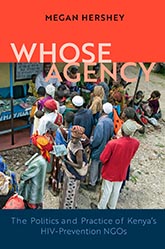|
Whose Agency
The Politics and Practice of Kenya’s HIV-Prevention NGOs
Megan Hershey
Africa and the Diaspora
Thomas Spear, Neil Kodesh, Tejumola Olaniyan, Michael G. Schatzberg, and James H. Sweet, Series Editors
“In vivid detail, Hershey provides the rare, truly nuanced view of development interventions. She argues that small, local NGOs can be successful emissaries of HIV/AIDS programming, even while they fail to achieve the true participatory development for which such NGOs are most lauded. A must-read for researchers interested in the on-the-ground politics of development program implementation.”
—Jennifer Brass, Indiana University
Nongovernmental organizations (NGOs) are ubiquitous in the Global South. Often international in origin, many attempt to assist local efforts to improve the lives of people often living in or near poverty. Yet their external origins often cloud their ability to impact health or quality of life, regardless of whether volunteers are local or foreign.
By focusing on one particular type of NGO—those organized to help prevent the spread and transmission of HIV in Kenya—Megan Hershey interrogates the ways these organizations achieve (or fail to achieve) their planned outcomes. Along the way, she examines the slippery slope that is often used to define “success” based on meeting donor-set goals versus locally identified needs. She also explores the complex network of bureaucratic requirements at both the national and local levels that affect the delicate relationships NGOs have with the state. Drawing on extensive, original quantitative and qualitative research, Whose Agency serves as a much-needed case study for understanding the strengths and shortcomings of participatory development and community engagement.
 Megan Hershey is an associate professor of political science at Whitworth University.
Megan Hershey is an associate professor of political science at Whitworth University.
Praise
“This carefully researched and highly readable account illuminates the creativity and adaptability of local NGOs working on HIV prevention in Kenya. Hershey shows how NGOs balance donor demands and community expectations to achieve direct and indirect results. An essential text for scholars of health and development.”
—Amy Patterson, University of the South
“Hershey offers a valuable articulation of the final mile of development interventions by revealing how small, local NGOs spread messages about HIV prevention. This research demonstrates the existence, strength, and reach of civil society in even the poorest of informal settlements.”
—Rachel Sullivan Robinson, American University
Of Related Interest
|

Cubans in Angola
South-South Cooperation and Transfer of Knowledge, 1976–1991
Christine Hatzky |

Rising Anthills
African and African American Writing on Female Genital Excision, 1960–2000
Elisabeth Bekers |
|

Larger images
May 2019
LC: 2018045828 RA
224 pp. 6 x 9
6 b/w photos, 7 b/w illus., 19 tables
|

